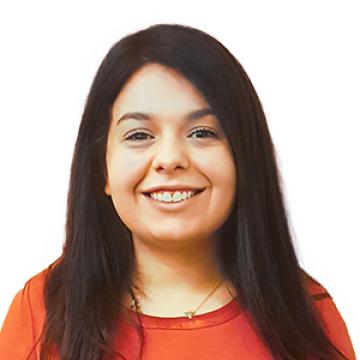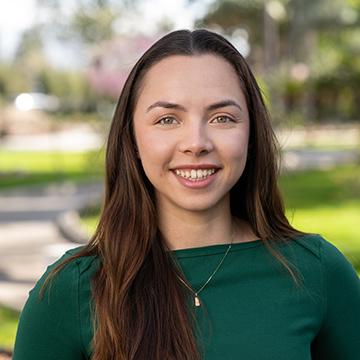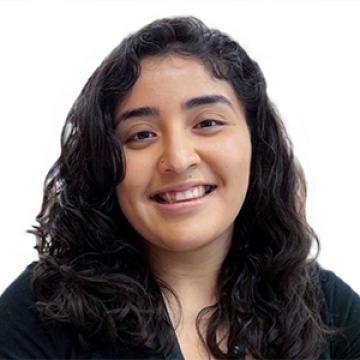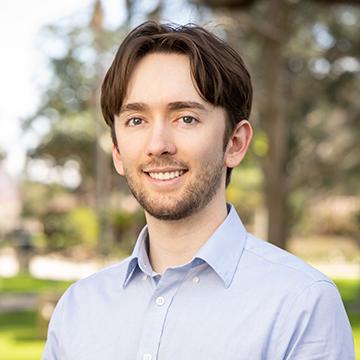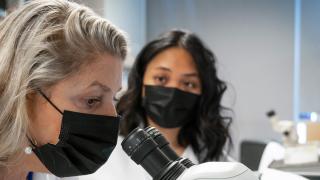
Diabetes PROMT - T32 Predoctoral Fellowship
The bench-to-bedside-to-bench organization of the PROMT program is singular and not replicated elsewhere.
The National Institute of Diabetes and Digestive and Kidney Diseases (NIDDK)-funded Diabetes Prevention Risk Omics Metabolism and Therapy of Diabetes (PROMT) Interdisciplinary Training Program provides two years of clinically relevant education and training.
The program is designed for students with analytic skills who desire top-flight, innovative training in the physiology and pathophysiology of diabetes and metabolism that is based on a foundation of fundamental basic science, hypothesis testing, drug identification and development and clinical trials.
As such, the bench-to-bedside-to-bench organization of the PROMT program is unique with a combined basic plus translational focus. Through the PROMT program, students at City of Hope have the structure and facilities to participate in the entire process of bringing new therapies online for the care and cure of diabetes and other metabolic diseases.
Central to the PROMT program mission is the integration of all program activities in order to tie together basic molecular research, state-of-the-art genomics and single cell sequencing technologies, bioinformatics research and science with drug development and clinical medicine.
Graduates will have the necessary skills and motivation to identify and overcome barriers to translating discoveries into practice for the betterment of individuals with diabetes and metabolic disease and their complications.
Predoctoral students enter the PROMT program after completing two years at the Irell & Manella Graduate School of Biological Sciences. The PROMT Ph.D. is accredited by the accrediting agency WASC Senior College and University Commission.
Faculty members are committed to recruiting students and making every effort to guarantee their success. Outstanding candidates with degrees emphasizing analytical training who have an interest in diabetes and metabolism as a career are encouraged to apply.
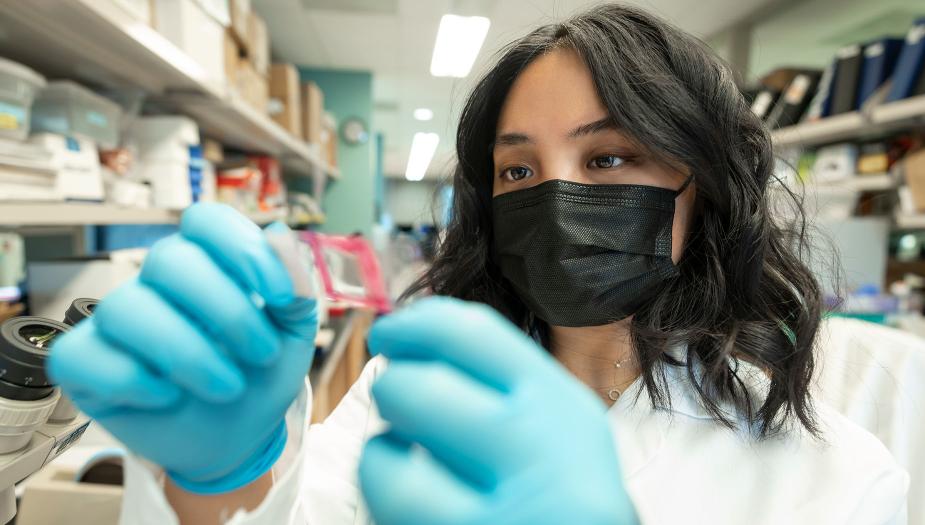
Program Co-Directors

Rama Natarajan, Ph.D.
Rama Natarajan is the National Business Products Industry Endowed Chair in Diabetes Research, professor and chair in the Department of Diabetes Complications & Metabolism at City of Hope.

Debbie C. Thurmond, Ph.D.
Debbie C. Thurmond, Ph.D., is director of the Arthur Riggs Diabetes & Metabolism Research Institute at City of Hope and chair and professor in the Department of Molecular & Cellular Endocrinology.
Our Way To Overcome Diabetes
The PROMT program’s faculty mentors, co-mentors and clinical partners are acknowledged experts and leaders in diabetes and metabolism research and clinical diabetes care. They will provide outstanding collaborative mentorship in diabetes research that supports the trainee’s long-term professional development. The PROMT program brings together mentors with diverse synergistic talents that cover three thematic knowledge areas:
Importantly, the PROMT faculty have mentored numerous predoctoral students who are now pursuing independent research careers in academics, government and industry.
Mentors and Co-Mentors
Prevention/Risk/Omics
Mentors
- Zhen Bouman Chen, Ph.D. - Role of noncoding RNAs and endothethial stress response in diabetes, obesity and metabolism
- Rama Natarajan, Ph.D. - Molecular and epigenetic mechanisms responsible for the cardiovascular and renal complications of diabetes
- Dustin E. Schones, Ph.D. - Epigenetic and genetic variation in obesity and diabetes
- Sarah Shuck, Ph.D. - Analytical chemistry to identify biomarkers and causes of cancer and diabetes
Co-Mentors
Therapy
Mentors
- Sangeeta Dhawan, Ph.D. - Epigenetic and cellular signaling pathways that regulate the formation, function, regeneration and survival of pancreatic beta cells during development and in stress
- John S. Kaddis, Ph.D. - Computational strategies to explore diversity in type 1 diabetes outcomes research and disease pathogenesis
- Hsun Teresa Ku, Ph.D. - Identification and manipulations of the stem/progenitor like cells residing in the ductal compartment of the adult pancreas for the treatment of type 1 diabetes.
- Hung-Ping Ben Shih, Ph.D. - Integrin signaling in beta cell development and maturation
- Alberto Pugliese, M.D. - Immunology and genetics of type 1 diabetes, disease prediction and prevention, pancreas pathology and islet/pancreas transplantation related research.
- Helena Reijonen, Ph.D. - Identification of novel immune phenotypes and pathways which contribute to the development and progression of autoimmunity in type 1 diabetes.
- Rupangi Vasavada, Ph.D. - Pathophysiology of type 1 diabetes and biologics as therapies
- Defu Zeng, M.D. - Reversing autoimmunity in type 1 diabetes, regeneration of beta cells and graft-versus-host disease in transplantation
Co-Mentors
Metabolism
Mentors
- Yingfeng Deng, Ph.D. - Metabolic impact of endoplasmic reticulum (ER) stress through unfolded protein response (UPR) and its relevance to insulin resistance.
- Adolfo Garcia-Ocaña, Ph.D. - Pancreatic beta-cell regeneration and immune tolerance
- Patrick Fueger, Ph.D. - Novel molecular regulators of functional beta cell mass
- Wendong Huang, Ph.D. - Bile acid signaling; benefits of bariatric surgery
- Ke Ma, Ph.D. - Circadian etiologies underlying metabolic disorders for targeted therapeutic interventions
- Debbie Thurmond, Ph.D. - Molecular mechanisms regulating insulin secretion in coordination with peripheral glucose clearance and their relative contribution and importance for whole body glucose metabolism and relationship to diabetes
- Qiong (Annabel) Wang, Ph.D. - Mechanisms that regulate the plasticity and function of adipocyte tissue to limit pathogenesis of, and develop treatments for, chronic metabolic diseases
- Zhao Wang, Ph.D. - Pathological cardiac remodeling due to cardiac hypertrophy, heart failure, cancer treatment, myocardial infarction, senescence and diabetes
Co-Mentors
Clinical Partners
Co-Mentors
- Saro Armenian, D.O., M.P.H. - Incorporating technology into long-term care and biomarker screening of high-risk groups
- Raynald Samoa, M.D. - Diabetes and healthy disparities in undeserved communities
- Ping Wang, M.D. - Molecular mechanisms of mitochondrial dysfunction in the context of diabetes and metabolic syndrome
Predoctoral T32 Application
Following matriculation into the Irell & Manella Graduate School of Biological Sciences, interested applicants should identify and choose a thesis mentor from the PROMT faculty, usually following several lab rotations. After the thesis mentor and student develop the applicant’s thesis project and training plan, the applicant should then complete the program application (below) at the end of year two. Recruitment committee members will then request an interview. The Recruitment and Program Executive committees will make the admission decisions.
Program Eligibility
Prospective candidates must be U.S. citizens or permanent residents. Successful completion of the two-year Irell & Manella Graduate School of Biologic Sciences (IMGS) core curriculum is required to be eligible for the PROMT program.
- PROMT T32 application form due end of IMGS Year 2
- Curriculum vitae
- Mentor letter of support
About The Program
The PROMT T32 program will enroll 2 students per year and train these students to be leaders in the vanguard of transitional and clinician research. PROMT graduates will be poised to overcome the scourges of diabetes and metabolic diseases. Under the direction of a primary mentor, co-mentor and clinical partners, students will be immersed in a rich, didactic environment of cross-disciplinary translational research.
- Structured education and training
- Individualized career development
- Didactic courses and educational opportunities within and beyond the program
- Focused and quality training in responsible and transparent research
- Rigorous training in scientific method, data analysis and scientific writing
- Ongoing internal and external monitoring of student progress and mentor performance
- One-of-a-kind access to fresh human endocrine organs, especially pancreata, islets and beta cells
- Access to fresh and biobanked human endocrine, exocrine and vascular tissues, and immune cells
- Multiple on-campus Food and Drug Administration-approved current Good Manufacturing Practice (cGMP) centers for the production of cell and noncell biologic therapies to treat diabetes and metabolic diseases and associated complications
Training Requirements
Accepted students will begin the PROMT program in the third year of IMGS education. Specific requirements included:
- PROMT required courses (see below)
- Perform diabetes research from years three onwards.
- Participate in journal clubs and seminars during training.
- Attend and present research at the annual PROMT retreat in years three onwards.
- Years 1 and 2: IMGS Core classes and qualifying examination
- Year 3: PROMT courses: BIOSCI 690 (Advanced Topics in Diabetes); BIOSCI 712 (Diabetes and Dysfunctional Metabolism Journal Club)
- Year 4: PROMT courses: BIOSCI 500 (Rigor and Reproductive Refresher); BIOSCI 712 (Diabetes and Dysfunctional Metabolism Journal Club); Diabetes Special Emphasis Translational Internship
Funding
The PROMT T32 program is funded by a grant from the National Institute of Diabetes and Digestive and Kidney Diseases and supplemented by City of Hope to provide two years of support, including free tuition and a competitive stipend and benefits.
All PROMT faculty mentors have established laboratories resources and financial support to host and mentor PROMT predoctoral students. Generous travel support is also provided for students to attend a national/international scientific meeting annually and to present their research findings.
Contact Us
1500 East Duarte Road
Duarte, CA 91010
DL-PROMT@coh.org
